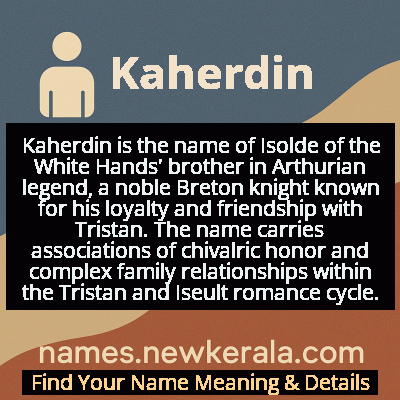Kaherdin Name Meaning & Details
Origin, Popularity, Numerology Analysis & Name Meaning of Kaherdin
Discover the origin, meaning, and cultural significance of the name KAHERDIN. Delve into its historical roots and explore the lasting impact it has had on communities and traditions.
Name
Kaherdin
Gender
Male
Origin
Arthurian
Lucky Number
7
Meaning of the Name - Kaherdin
Kaherdin is the name of Isolde of the White Hands' brother in Arthurian legend, a noble Breton knight known for his loyalty and friendship with Tristan. The name carries associations of chivalric honor and complex family relationships within the Tristan and Iseult romance cycle.
Kaherdin - Complete Numerology Analysis
Your Numerology Number
Based on Pythagorean Numerology System
Ruling Planet
Neptune (Ketu)
Positive Nature
Intuitive, analytical, spiritual, and inquisitive.
Negative Traits
Secretive, reserved, aloof, and can be overly critical.
Lucky Colours
Green, yellow.
Lucky Days
Monday.
Lucky Stones
Cat’s eye, moonstone.
Harmony Numbers
1, 5, 6.
Best Suited Professions
Scientists, researchers, spiritual leaders, detectives.
What People Like About You
Depth of knowledge, analytical skills, spirituality.
Famous People Named Kaherdin
Kaherdin of Brittany
Arthurian Knight
Brother of Isolde of the White Hands and loyal companion to Tristan
Kaherdin the Valiant
Literary Character
Key supporting character in Tristan and Iseult medieval romances
Kaherdin of Leonais
Mythical Noble
Breton nobleman featured in Arthurian legend cycles
Name Variations & International Equivalents
Click on blue names to explore their detailed meanings. Gray names with will be available soon.
Cultural & Historical Significance
The cultural significance of Kaherdin extends beyond his narrative function to represent broader themes in medieval literature. As a character who remains loyal to Tristan despite the knight's complicated relationship with his sister, Kaherdin embodies the chivalric ideal of friendship transcending personal inconvenience. His presence in the story also reflects the political realities of medieval Europe, where noble families like his in Brittany maintained complex relationships with the British aristocracy. Through Kaherdin, medieval writers explored themes of honor, forgiveness, and the sometimes conflicting demands of different types of loyalty, making him a nuanced figure who adds depth to the primary Tristan and Iseult narrative.
Extended Personality Analysis
Kaherdin is characterized by his strong sense of loyalty and honor, traits that define his actions throughout the Tristan legends. Initially protective of his sister Isolde, he demonstrates family devotion and aristocratic pride. However, his personality shows remarkable depth and evolution as he develops a genuine friendship with Tristan, revealing his capacity for forgiveness and understanding. This transformation from potential adversary to loyal friend highlights Kaherdin's open-mindedness and emotional intelligence. His knightly virtues are balanced by practical wisdom, making him both a capable warrior and a thoughtful counselor.
Beyond his chivalric qualities, Kaherdin exhibits emotional complexity in how he navigates the tragic love triangle involving his sister. He shows compassion for Tristan's predicament while maintaining concern for Isolde's wellbeing, demonstrating his ability to see multiple perspectives in emotionally charged situations. His personality combines the ideal medieval nobleman's courage and honor with very human vulnerabilities and conflicts. Kaherdin's character arc represents the medieval ideal of personal growth through experience, as he learns to balance different loyalties and make difficult moral choices with grace and wisdom.
Modern Usage & Popularity
In contemporary times, Kaherdin remains an exceptionally rare name, primarily known to scholars of Arthurian literature and enthusiasts of medieval romance. Its usage is almost entirely confined to literary contexts or as a distinctive choice for characters in historical fiction and fantasy works. The name has never appeared on popular baby name lists and maintains a status as an obscure mythological reference rather than a practical given name. However, with the recent trend toward unique and meaningful names, Kaherdin occasionally surfaces among parents deeply interested in Arthurian legend who seek names less common than Arthur or Lancelot. Its pronunciation challenges and unfamiliar sound to modern ears likely contribute to its continued rarity, keeping it firmly in the category of academic and literary names rather than mainstream usage.
Symbolic & Spiritual Meanings
Symbolically, Kaherdin represents the medieval ideal of sworn brotherhood and loyal companionship that transcends even family obligations. His character serves as a metaphor for the complex interplay between different forms of loyalty—to family, to friends, and to personal honor. The name has come to symbolize the capacity for forgiveness and understanding in difficult circumstances, as Kaherdin must reconcile his protective feelings for his sister with his growing friendship with Tristan. In broader terms, he represents the bridge between different cultural traditions within the Arthurian world, embodying the fusion of Celtic and French literary influences that characterized later medieval romance. His story symbolizes the idea that true nobility involves not just birthright but the ability to navigate moral complexity with wisdom and compassion.

